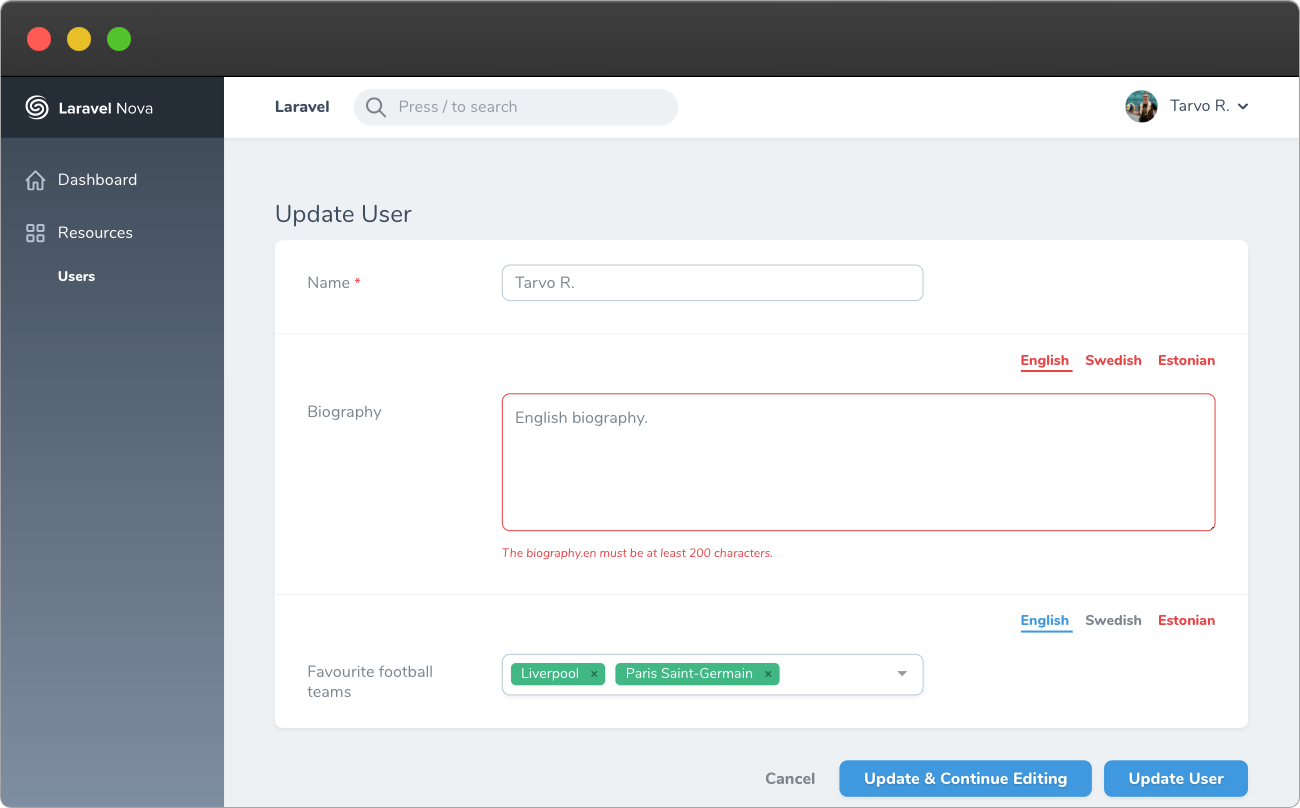juniora / nova-translatable
A laravel-translatable extension for Laravel Nova.
Installs: 283
Dependents: 0
Suggesters: 0
Security: 0
Stars: 1
Watchers: 0
Forks: 64
pkg:composer/juniora/nova-translatable
Requires
- php: >=8.0
- laravel/nova: ^4.12
- nova-kit/nova-packages-tool: ^1.0
- spatie/laravel-translatable: ^4.0 || ^5.0 || ^6.0
This package is not auto-updated.
Last update: 2026-02-10 16:51:24 UTC
README
This Laravel Nova allows you to make any input field spatie/laravel-translatable compatible and localisable.
Requirements
PHP: ^8.0laravel/nova: ^4.12spatie/laravel-translatable: ^4.0 || ^5.0 || ^6.0
Features
- Supports almost all fields (including third party ones)
- Supports default validation automatically
- Simple to implement with minimal code changes (after
spatie/laravel-translatablesupport) - Locale tabs to switch between different locale values of the same field
- Double click on a tab to switch all fields to that locale
- Supports nova-settings package
Known non-working fields
ImageandFile- Workarounds:
- outl1ne/nova-media-hub
- or any library that uploads images/files using XHR
- Workarounds:
Limitations
- The following methods can not be used, as this package uses them internally:
resolveUsingfillUsing
Screenshots
Installation
Firstly, set up spatie/laravel-translatable.
Install the package in a Laravel Nova project via Composer:
# Install nova-translatable composer require juniora/nova-translatable # Publish configuration (optional, but useful for setting default locales) php artisan vendor:publish --tag="nova-translatable-config"
Usage
Call ->translatable() on any field, like so:
// Any Nova field Text::make('Name') ->rules('required', 'min:2') ->translatable(), // Any third-party input field Multiselect::make('Football teams') ->rules('required') ->translatable(), // Optionally pass custom locales on a per-field basis Number::make('Population') ->translatable([ 'en' => 'English', 'et' => 'Estonian', ]),
Validation
It's possible to define locale specific validation rules.
To do so, add the ->rulesFor() on your field and the HandlesTranslatable trait to your Nova resource.
->rulesFor accepts array|string|callable locales and array|callable rules.
use Outl1ne\NovaTranslatable\HandlesTranslatable; class Product extends Resource { use HandlesTranslatable; public function fields(Request $request) { return [ Text::make(__('Name'), 'name') ->sortable() ->translatable() ->rules(['max:255']) ->rulesFor('en', [ 'required', ]) ->rulesFor(['en', 'et'], function ($locale) { return ["unique:products,name->$locale{{resourceId}}"]; }), ]; } }
In this example, rules will be added to the following values
max: name.* required: name.en unique: name.en & name.et
Configuration
You can define default locales for all the translatable fields in the config file. The config file can be published using:
php artisan vendor:publish --tag="nova-translatable-config"
Fill other locales from config option
The configuration option fill_other_locales_from allows you to pre-fill other locales from just one locale. This requires the resources to also have the HandlesTranslatable trait.
One select for all fields on a page
If you don't want to display the locale select next to each field, you can set the display_type to none and add a Outl1ne\NovaTranslatable\Fields\LocaleSelect field to your Nova resource. This will render a single select for all fields.
Edge cases
BelongsToMany allowDuplicateRelations corner-case
When using this field inside a BelongsToMany as a pivot field with ->allowDuplicateRelations() and you want to filter out exact matches using the NotExactlyAttached rule, use the BelongsToManyTranslatable field instead of the regular BelongsToMany.
Credits
License
This project is open-sourced software licensed under the MIT license.



